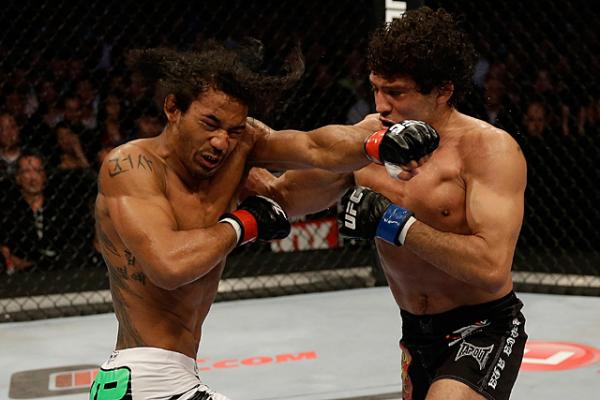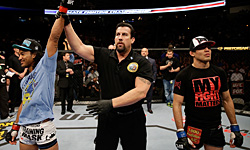Viewpoint: The Case for Seven Rounds

Should championship fights go seven rounds? Tell us below in the
comments section. | Ezra Shaw/Zuffa LLC/Getty Images
Back in June 2011, the Ultimate Fighting Championship announced that a radical and groundbreaking new idea, five-round headliners, would soon be implemented on all its cards.
It did not matter if a belt was at stake, nor was it important if the main event paired serious title contenders or fan-friendly gatekeepers. If your name was at the top of the bill, you would be given 25 minutes to do your job. The change went into effect on Nov. 5, 2011, when Mark Munoz squared off with Chris Leben at UFC 138 in Birmingham, England. Munoz did not need nearly that long to dismantle “The Ultimate Fighter 1” veteran, as the bout was halted with a battered and bloodied Leben unable to see clearly after two rounds.
Advertisement
To this day, no bout quite validates the UFC’s big decision like “Hendo” vs. “Shogun.” Even if five rounds have not been needed for every non-title feature since, it sure is nice to know the extra 10 minutes are available if necessary. It was an astute call by UFC President Dana White and Co., one that can be universally praised since its inception.
However, now might be the time to move that line of thinking
forward. Now is the time to consider seven rounds for championship
fights.
Benson Henderson eked past Gilbert Melendez on Saturday to retain his lightweight crown in the UFC on Fox 7 headliner. It was the second split verdict in three title defenses for “Smooth,” who, with the exception of a dominant win over Nate Diaz in December, has made white-knuckle affairs the norm in recent outings.
Like his two bouts with Frankie Edgar, this one left nearly everyone but the winning corner feeling less than satisfied. Those aligned with Henderson probably saw the champion taking three, maybe four rounds from “El Nino.” Supporters of Melendez surely felt the former Strikeforce king pushed the pace enough to get the nod from the cageside judges, and one -- Wade Vierra had it 48-47 in favor of Melendez -- agreed.

Ezra
Shaw/Zuffa LLC/Getty Images
Melendez fell short on two scorecards.
Examine round-by-round scoring, and the results are all over the grid. Judges Michael Bell, Derek Cleary and Vierra reached a consensus on only two of five frames, with all giving Melendez round one and Henderson round three. Unofficial scorekeeping data was similarly scattered.
It was one of those fights that can be difficult to discern with the naked eye. If you watched at home on television, you could have seen a different fight than those who attended live; if you went into the bout with the expectation that either Henderson or Melendez was going to win, it probably changed the way you viewed the action; and if you took everything in with your heart rather than your head, well, it is almost certain that your scorecard felt the effects.
Even the most keen, calculating observer -- when removing the need to be right from the equation -- would have to admit that Henderson-Melendez was a bout where shifts in momentum were subtle.
The final statistics released by FightMetric, which scored the bout 50-48 for Henderson, gave the MMA Lab product only a slight advantage. In a bout where takedowns were nearly nonexistent, Henderson held an edge in significant strikes landed in every frame: nine to seven in round one, 15 to 13 in round two, 15 to seven in round three, 15 to eight in round four and 14 to eight in round five.
Still, those figures do not seem to tell the entire story. While Henderson did to have a clear edge when attacking with leg kicks, many of the standup exchanges appeared to be nearly even. FightMetric follows a strict methodology when it comes to reviewing fights, which includes watching those same exchanges in slow motion. Human error is still involved but probably less so than for someone watching in real time. However, the raw data does not make the ruling any less palatable for Team Melendez.
“It’s a Ben Henderson fight. All his fights go to decisions -- and controversial decisions,” White said at the post-fight press conference.
Maybe not all of them; victories over Mark Bocek, Jim Miller and Clay Guida were never really in question. Still, in a division that remains the UFC’s deepest, emphatic finishes and one-sided beatdowns can be difficult to come by at the highest level. On Saturday, two more rounds might have been enough to allow someone, whether it was Henderson or Melendez, to truly put his stamp on the fight.
The other option, of course, is the immediate rematch. Edgar had three consecutive title rematches during his time at lightweight, and the masses were none too pleased about it.
“I know some guys are not too big on the rematch,” Henderson said on Fuel TV. “I had to do that whole rematch thing again. If it is, I’ll do it again, but there are some true killers at 155 in the UFC -- perhaps the most stacked weight class there is -- so I know I got a long list of guys who want to beat the crap out of me.”
It looks like Melendez will have to wait, as White announced that the winner of the Gray Maynard-T.J. Grant bout at UFC 160 will get the next crack at Henderson. A good rematch, or even a trilogy, can have its own charm and appeal, but clear resolution the first time around could prove to be more satisfying.
There is a reason the NBA, MLB and NHL have primarily best-of-seven formats in their playoffs: it allows the superior team every opportunity to win. MMA is generally less predictable, but title fights -- non-title affairs should remain five rounds -- deserve a longer period of time to unfold, especially in the lower weight classes, where frantic, closely contested action so often rules the day.
It is possible, even likely, that many title fights will not require nearly that many frames. As it is, few expect Jon Jones-Chael Sonnen or Cain Velasquez-Antonio Silva to go five full rounds, let alone a hypothetical seven, but it would be nice to have that option.
Seventeen months after the fact, no one is complaining about the presence of five-round headliners. While an ever-expanding roster has made for a bigger, longer fight cards already, a couple of extra rounds for the promotion’s most important bouts would not hurt. Some things make staying up late worthwhile.
Related Articles






